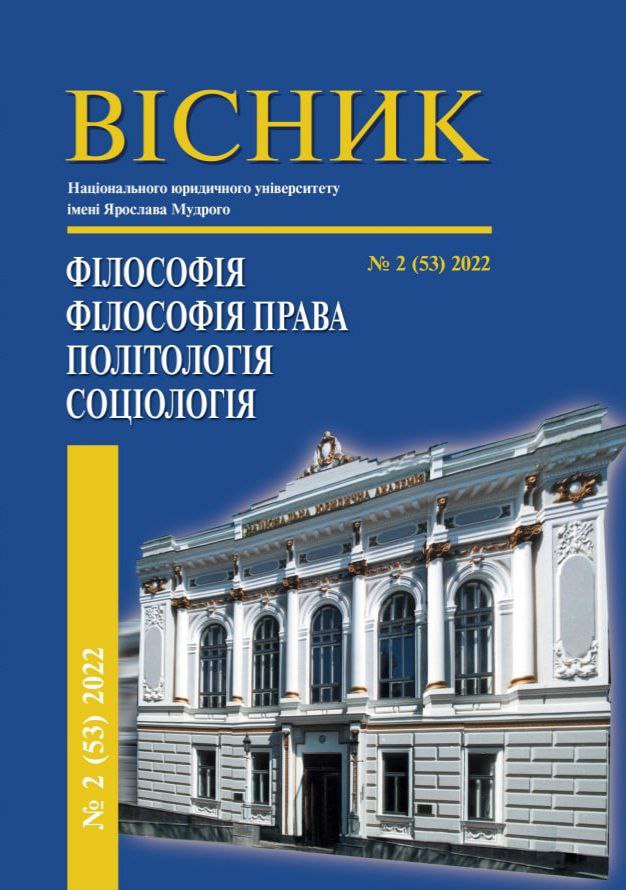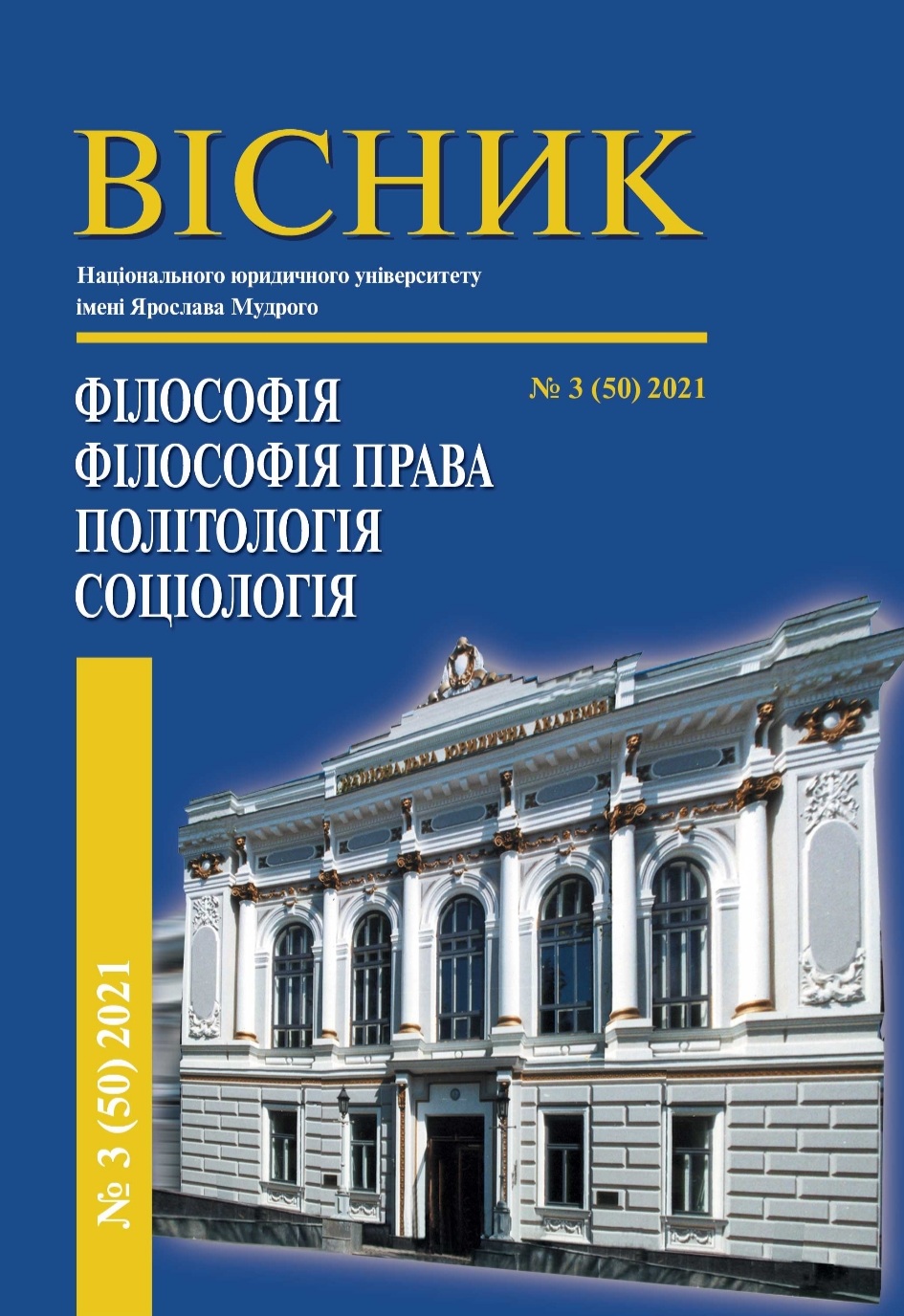МАКРОКОЛИВАННЯ МІЖНАРОДНОЇ СИСТЕМИ ПІД ВПЛИВОМ ГЛОБАЛЬНОЇ ТУРБУЛЕНТНОСТІ ТА ГІБРИДНИХ ВІЙН
DOI:
https://doi.org/10.21564/2663-5704.53.258166Ключові слова:
міжнародна система, глобальна турбулентність, геополітичні зсуви, тероризм, гібридні війниАнотація
У статті шляхом методологічного синтезу здійснено феноменологію «міжнародної системи», критично впорядковані її ознаки та різноманітні типи. Обґрунтовано, як транзитивний, тип і характер сучасної планетарної системи «дисбалансу та взаємних урівноважень», що коливається у межах векторів однополярності та мультиполярності за умов конкуренції центрів глобального впливу різної потужності: США, Євросоюзу, Китаю та Японії, РФ, країн-лідерів Близького Сходу. Досліджуються «геополітичні зсуви», як чинники, що зумовили глобальну турбулентність і макроколивання перехідної міжнародної системи: остаточний крах колоніальної системи; руйнування моделі «двополюсного світу» і вихід на світову арену суверенних держав, які запроваджують власні геостратегії; проблеми співіснування країн сталої й транзитивної демократії, автократій та специфічних квазі-держав; стратегічний зсув Балто-Черноморської дуги до кордонів Росії з Балтією, Україною, Грузією; глобальний економічний ривок Південно-Східної Азії, як субрегіональної системи; посилення економічної конкуренції стратегічних партнерів – США та Євросоюзу; зростання військово-політичного напруження між РФ та США і НАТО тощо. Одним з найбільш дестабілізуючих чинників сучасної міжнародної системи, що сприяє її турбулентності, виступають гібридні війни. Обґрунтовано, що гібридна війна – це комбінація партизанської та громадянської воєн, а також заколоту і тероризму. Надано характеристику основних учасників гібридної війни: армії, терористів, партизанів, повстанців тощо, а також особливості притаманних їм бойових дій.
Посилання
Huntzinger, J. (1987). Introduction aux relations internationales. Paris: Le Seuil.
Herasina, L. M., & Trebin, M. P. (2020). “Zlamy svitosystemy”: hlobalni zrushennia ta hibridni vyklyky [“Fissure of the world system”: global shifts and hybrid challenges]. Visnyk Natsionalnoho yurydychnoho universytetu imeni Yaroslava Mudroho. Seriia: Filosofiia, filosofiia prava, politolohiia, sotsiolohiia Bulletin of the Yaroslav Mudryi National Law University. Series: Philosophy, Philosophy of Law, Political Science, Sociology, 4(47), 72–93. DOI: https://doi.org/10.21564/2075-7190.47.218961 [in Ukrainian].
Easton, D. (1979). A systems analysis of political life. Chicago: University of Chicago Press.
Easton, D. (1990). The analysis of political structure. New York: Routledge.
Kaplan, M. A. (1957). System and Process in International Politics. New York: John Wiley.
Parsons, T. (1991). The social system / with a new preface by Bryan S. Turner. London: Routledge.
Hoffmann, S. (1961). Théorie et relations internationales. Revue française de science politique, 11 (2), 413-433. DOI: 10.3406/rfsp.1961.392626
Polin, C. (1971). David Easton, ou les difficultés d'une certaine sociologie politique. Revue française de Sociologie, XI-XII (spéc.), 183-193.
Aron, R. (2006). Paix et guerre entre les nations. Paris: Calmann-Lévy.
Luard, E. (1976). Types of international society. New York: Free Press.
Rosecrance, R.N. (1963). Action and Reaction in World Politics: International Systems in Perspective. Boston, MA: Little, Brown.
Cohen, S.B. (2010). Evaluating Systemic Geopolitics – A Twenty-First Century View, Geopolitics, 15(1), 157-164. DOI: 10.1080/14650040903420461
Cox, M. (2019). The post Cold War world: turbulence and change in world politics since the fall. London; New York: Routledge Taylor & Francis Group.
Dussouy, G. (2010). Systemic Geopolitics: A Global Interpretation Method of the World. Geopolitics, 15(1), 133-150. DOI: 10.1080/14650040903420438
Jervis, R. (2010). Thinking Systemically about Geopolitics. Geopolitics, 15(1), 165-171. DOI: https://doi.org/10.1080/14650040903420479
Kaplan, R.D. (2009). Center Stage for the Twenty-first Century: Power Plays in the Indian Ocean. Foreign Affairs, 88(2), 16-29, 31-32.
Freedman, L. (2017). The future of war: a history. New York: Public Affairs.
Kaldor, M. (2013). In Defence of New Wars. Stability, 2(1): 4, 1-16, DOI: http://dx.doi.org/10.5334/sta.at
Krotiuk, V.A. (ed.) (2021). Viiny informatsiinoi epokhy: mizhdystsyplinarnyi dyskurs [Wars of the information age: interdisciplinary discourse]: monohrafiia. Kharkiv: FOP Fedorko M. Yu. [in Ukrainian].
Malešević, S. (2010). The sociology of war and violence. Cambridge; New York: Cambridge University Press.
Murray, W., & Mansoor, P.R. (2012). Hybrid warfare: fighting complex opponents from the ancient world to the present. New York: Cambridge University Press.
Patrikarakos, D. (2017). War in 140 characters : how social media is reshaping conflict in the twenty-first century. New York: Basic Books.
Simons, G., & Chifu, I. (2018). The changing face of warfare in the 21st century. London; New York: Routledge, Taylor & Francis Group.
Trebin, M. (2005). Voynyi XXI veka [Wars of 21st century]. Moskva: AST; Minsk: Harvest [in Russian].
Van Creveld, M. (1991). The transformation of war. New York: Free Press; Toronto: Collier Macmillan Canada; New York: Maxwell Macmillan International.
Van Creveld, M. (2017). More on war. Oxford : Oxford University Press.
Braillard, P. (1977). Théories desrelations internationals. Paris: P.U.F.
Herasina, L.M., Pohribna, V.L., & Trebin, M.P., et al. (2016). Teoriia mizhnarodnykh vidnosyn. Mizhnarodni vidnosyny ta svitova polityka [The theory of international relations. International relations and world politics]. Kharkiv: Pravo [in Ukrainian].
Andrain, C. F. (1994). Comparative political systems: policy performance and social change. Armonk, N.Y.: M.E. Sharpe.
Lijphart, A. (1984). Democracies: Patterns of Majoritarian and Consensus Government in Twenty-one Countries. New Haven: Yale University Press.
Carter, J.H., & Warren, R. (2019). Forging the modern world: a history. Second edition. New York: Oxford University Press.
Dickinson, E.R. (2017). The world in the long twentieth century: an interpretation. Oakland, California: University of California Press.
Estevadeordal, A., & Goodman, L.W. (eds.) (2017). 21st century cooperation: regional public goods, global governance, and sustainable development. London; New York: Routledge, Taylor & Francis Group.
Jindal, N., & Kumar, K. (eds.) (2018). Global politics: issues and perspectives. New Delhi, India; Thousand Oaks, California: SAGE Publications.
Laurent, É. (2018). Measuring tomorrow: accounting for well-being, resilience, and sustainability in the twenty-first century. Princeton; Oxford: Princeton University Press.
Braillard, P., & Djalili, M.-R. (2016). Les relations internationales. 10e édition. Paris: P.U.F. 128 p.
Mattis, J. N., & Hoffman, F. G. (2005). Future Warfare: The Rise of Hybrid Wars. US Naval Institute Proceedings Magazine, 132/11/1,233, 18-19.
Hoffman, F.G. (2006). Complex Irregular Warfare: The Next Revolution in Military Affairs. Orbis, 50 (3), 395-411.
Hoffman, F.G. (2007). Conflict in the 21st Century: The Rise of Hybrid Wars. Arlington, VA: Potomac Institute for Policy Studies.
Hoffman, F.G. (2009a). Hybrid Warfare and Challenges. Joint Force Quarterly, 1st Quarter (52), 34-39.
Hoffman, F.G. (2009b). Hybrid Threats: Reconceptualizing the Evolving Character of Modern Conflict. Strategic Forum, April (240), 1-8.
Hoffman, F.G. (2009c). Hybrid vs. compound war. Armed Forces Journal, October. Retrieved from: http://armedforcesjournal.com/hybrid-vs-compound-war/
Hoffman, F.G. (2010). “Hybrid Threats”: Neither Omnipotent Nor Unbeatable. Orbis, 54(3), 441-455.
Hoffman, F.G. (2014). The Real “Forever War”. Orbis, 58(2), 297-301.
Hoffman, F.G. (2016). Foresight into 21st Century Conflict: End of the Greatest Illusion? Foreign Policy Research Institute. The Philadelphia Papers. September.
Trebin, M.P., & Chernyshova, T.O. (2017). Evoliutsiia viin kriz pryzmu revoliutsii u viiskovii spravi [The evolution of wars through the prism of revolutions in military affairs]. Suchasna viina: humanitarnyi aspekt. Naukovo-praktychna konferentsiia Kharkivskoho natsionalnoho universytetu Povitrianykh Syl imeni Ivana Kozheduba, 30 chervnia 2017 roku: tezy dopovidei Modern war: the humanitarian aspect. Scientific and practical conference of Ivan Kozhedub Kharkiv National University Air Force, June 30, 2017: abstracts, Pp. 16-21. Kharkiv: KhNUPS im. I. Kozheduba [in Ukrainian].
Bjerregaard, T. (2012). Hybrid Warfare: A Military Revolution or Revolution in Military Affairs? Fort Leavenworth, Kansas. Retrieved from: https://www.difesa.it/SMD_/CASD/IM/IASD/65sessioneordinaria/Documents/HYBRIDWARFAREINMILITARYAFFAIRSMO.pdf
Herasina, L.M., Panfilov, O.Yu., & Pohribna, V.L., et al. (2020). Sotsiolohiia prava: entsyklopedychnyi slovnyk [Sociology of law: encyclopedic dictionary] / za red. M.P. Trebina. Kharkiv: Pravo [in Ukrainian].
Gorlach, N.I., & Trebin, M.P. (eds.) (2006). Sovremennyj terrorizm [Modern terrorism]. Uchebnoe posobie dlja vysshej shkoly. Har’kov: Timchenko [in Russian].
Alexander, Y., Carlton, D., & Wilkinson, P. (eds.) (1979). Terrorism: Theory and Practice. Boulder, Colorado: Westview Press.
Kelman, H. (1973). Violence without Moral Restraint: Reflection on the Dehumanisation of Victims and Victimizers. The Journal of Social Issues, 29 (4), 25-63.
Guevara, C. (1969). Guerrilla warfare / prefatory note by I.F. Stone; translated from the Spanish by J.P. Morray. New York : Vintage Books.
Schmitt, C. (2007). Theory of the partisan: intermediate commentary on the concept of the political / translated by G. L. Ulmen. New York: Telos Press Pub.
Wilkinson, P. (1986). Terrorism & the Liberal State. 2nd edition. Basingstoke: Palgrave Macmillan.
Baudrillard, J. (1981). Simulacres et simulation. Paris: Galilée.




